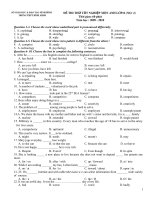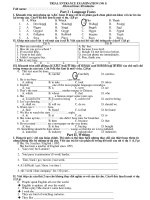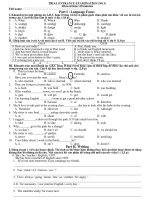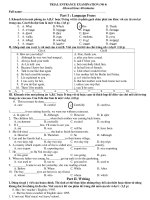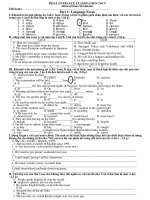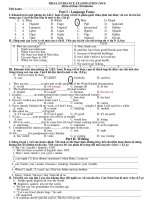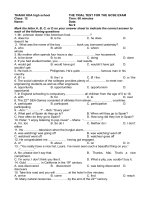TRIAL TEST 008
Bạn đang xem bản rút gọn của tài liệu. Xem và tải ngay bản đầy đủ của tài liệu tại đây (85.01 KB, 7 trang )
SƠ GD&ĐT VINH PHUC
TRƯƠNG THPT LIÊN SƠN
(Đề thi gồm: 04 trang)
ĐỀ KTCL ƠN THI THPT QUỐC GIA NĂM 2017-2018
Mơn: TIẾNG ANH – ĐỀ SỐ 08
Thời gian làm bài: 60 phút, không kể thời gian phát
đề
Ho và tên thi sinh:……………………………………………………………………. SBD:…………………………
Choose the word whose underlined part is pronounced differently from that of the others in
the group.
Question 1: A. honest
B. home
C. vehicles
D. heiress
Question 2: A. books
B. carrots
C. floors
D. slopes
Mark the letter A, B, C or D on your answer sheet to indicate the word that differs from the rest in
the position of the main stress in each of the following word.
Question 3: A. company
B. atmosphere
C. customer
D. employment
Question 4: A. institution
B. university
C. preferential
D. indicative
Question 5: A. environment
B. difficulty
C. community
D. inhabitant
Mark the letter A, B, C, or D on your answer sheet to indicate the word that is CLOSEST in
meaning to the underlined part in each of the following questions.
Question 6: In most countries, compulsory military service does not apply to women.
A. superior
B. mandatory
C. beneficial
D. constructive
Question 7: The kidnapper gave himself up to the authorities.
A. surrendered
B. confided himself C. went up
D. accommodated himself
Question 8: The famous racehorse Secretariat had to be destroyed because of a painful, incurable
hoof disease. A. irreparable B. vexatious
C. dangerous
D. disabling
Mark the letter A, B, C, or D to indicate the word or phrase that is OPPOSITE in meaning to the
italic part in each of the following questions.
Question 9: The earth is being threatened and the future looks bad.
A. done
B. made
C. defended
D. varied
Question 10: Thousands are going starving because of the failure of this year's harvest.
A. hungry
B. poor
C. rich
D. full
Choose the word or phrase (marked A, B, C, and D) which be changed in order for the
sentence to be correct.
Question 11: Paulo has learnt English for five years ago.
A. English
B. ago
C. Paulo
D. has learnt
Question 12: Although they always argue with each other, but they are good friends.
A. with
B. but
C. friends
D. always
Question 13: He stopped to smoke because cigarettes are harmful to his health.
A. are
B. to smoke
C. health
D. to
Question 14: The professor together with his three students have been called to court.
A. have
B. The
C. to
D. together
Question 15: Her passion for helping people have motivated her to found her own charity
organization. A. for
B. own charity
C. have
D. found
Mark the letter A, B, C or D on your answer sheet to indicate the correct answer to each of the
following questions.
Question 16: When friends insist on____________ expensive gifts, it makes most people
uncomfortable.
A. them to accept
B. they accepting
C. their accepting
D. they accept
Question 17: John lost the____________ bicycle he bought last week and his parents were very angry
with him because of his carelessness.
A. beautiful Japanese blue new
B. beautiful new blue Japanese
C. new beautiful blue Japanese
D. Japanese beautiful new blue
Question 18: Dr. Evans has____________ a valuable contribution to the life of the school.
A. done
B. created
C. caused
D. made
Question 19: Last year she earned____________ her brother.
A. twice as much as B. twice more than C. twice as many as
D. twice as more as
Question 20: - Linda: “I've passed my driving test." - Peter: “_________________”
A. Congratulations!
B. That's a good idea
C. It's nice of you to say so.
D. Do you?
Question 21: ____________ the storm, the ship couldn't reach its destination on time.
A. Because of
B. In case of
C. In spite of
D. But for
Question 22: - Lan: "Happy birthday! This is a small present for you." - Nga: “______________”
A. What a pity!
B. How terrible!
C. Have a good time!
D. How beautiful it is! Thanks.
Question 23: Remember to appreciate what your friends do for you. You shouldn’t take them_____.
A. as a rule
B. as usual
C. out of habit
D. for granted
Question 24: The twins look so much alike that almost no one can____________ them____________.
A. take/apart
B. tell/away
C. tell/apart
D. take/on
Question 25: Western women are more____________ than Asian women
A. depend
B. independent
C. independently
D. dependent
Question 26: Shy people often find difficult to__________ group discussion.
A. take part in
B. get on with
C. take place in
D. get in touch with
Question 27: They asked me a lot of questions, __________ I couldn't answer.
A. much of which
B. both of them
C. neither of which D. most of which
Question 28: I walked away as calmly as I could. ____________ , they would have thought I was a thief.
A. In case
B. If so
C. Or else
D. Owing to
Question 29: _______ how much money she spends on her clothes, she never looks well-dressed.
A. Despite
B. Without
C. Regardless
D. No matter
Question 30: Choose the best arrangement of the sentences marked i, ii, iii, iv to make a short
dialogue.
i. Fine. Thank you for the party last night I had a great time.
ii. Hello, Tom. This is Maria. iii. Good. I'm glad you enjoyed. iv. Hi, Maria, how are you?
A. ii-iv-i-iii
B. i-iii-ii-iv
C. iv-i-ii-iii
D. iii-i-ii-iv
Mark the letter A, B, C or D on your answer sheet to indicate the correct word or phrase to fill
in the blank in the following passage.
A trend that has emerged recently is the sharing of childcare (31)_________ between husband
and wife. Young couples will try to arrange their work schedules so that they work (32)_________
hours or shifts in order that one parent is always home with the children. Since childcare is
expensive, this saves money for the young couple trying to establish (33)_________ and provide a
secure environment for the family. Husband and wife may also share household (34)_________. Some
fathers are just as capable as mothers at cooking dinner, changing and bathing the baby, and doing
the laundry.
In some cases, the woman’s salary is for family (35)_________ and the father becomes the
“househusband." These cases are still fairly rare. One positive trend, however, is that fathers seem to
be spending more time with their children. In a recent survey, 41% of the children sampled said
they spend equal time with their mothers and fathers. “This is one of our most (36)_________ cultural
changes,” says Dr. Leon Hoffman, who co-directs the Parent Child Center at the New York
Psychoanalytic Society. In practice, for over 30 years, Hoffman has found "a very dramatic
difference in the involvement of the father in everything from care-taking to general decision
(37)_________ around kids' lives.”
Another factor has recently been added to the childcare (38)_________. The number of people
who work from home nearly full-time rose 23% from the last decade. The (39)_________ of
technology - computers, faxes, teleconferencing - has made it easier for at-home workers to be
constantly in touch. Will this new flexibility in the workforce bring a positive change for the
(40)_________ of children? Only time will tell.
(From Mosaic Reading I by Brenda Wegmann and Miki Knezevic)
Question 31: A. abilities
B. possibilities
C. responsibilities D. techniques
Question 32: A. opposite
B. during
C. for
D. similar
Question 33: A. himself
B. themselves
C. herself
D. itself
Question 34: A. dreams
B. duties
C. facilities
D. opportunities
Question 35: A. payment
Question 36: A. significant
Question 37: A. giving
Question 38: A. sectors
Question 39: A. accessible
Question 40: A. well-being
B. fares
B. significance
B. creating
B. tasks
B. accessibly
B. human being
C. expenses
C. significantly
C. holding
C. formula
C. access
C. love
D. fees
D. sign
D. making
D. cost
D. accessibility
D. gender
Read the following passage and mark the letter A, B, C or D on your answer sheet to indicate
the correct answer to each of the questions.
Choosing a career may be one of the hardest jobs you ever have, and it must be done with
care. View a career as an opportunity to do something you love, not simply as a way to earn a living.
Investing the time and effort to thoroughly explore your options can mean the difference between
finding a stimulating and rewarding career and move from job to unsatisfying job in an attempt to
find the right one. Work influences virtually every aspect of your life, from your choice of friends to
where you live. Here are just a few of the factors to consider.
Deciding what matters most to you is essential to making the right decision. You may want to
begin by assessing your likes, dislikes, strengths, and weaknesses. Think about the classes, hobbies,
and surroundings that you find most appealing. Ask yourself questions, such as “Would you like to
travel? Do you want to work with children? Are you more suited to solitary or cooperative work?”
There are no right or wrong answers; only you know what is important to you. Determine which
job features you require, which ones you would prefer, and which ones you cannot accept. Then
rank them in order of importance to you.
Question 41. The author states that “There are no right or wrong answers” in order to____________.
A. emphasize that each person’s answers will be different.
B. show that answering the questions is a long and difficult process.
C. indicate that the answers are not really important.
D. indicate that each person’s answers may change over time.
Question 42: The word “them” in paragraph 2 refers to____________.
A. questions
B. answers
C. features
D. jobs
Question 43: The word “assessing” in paragraph 2 could best be replaced by____________.
A. discoveringB. considering
C. measuring
D. disposing
Question 44: Those are all the factors you should take into account when choosing a job EXCEPT
for __________.
A. Your likes and your dislikes
B. The atmosphere at work
C. Geographical location
D. Your strengths and weaknesses
Question 45: According to the passage, which of the following is true?
A. Choose whatever job you like.
B. Never care about the right or wrong answer.
C. Decide to choose job offered to you.
D. Ask yourself about what you like.
Mark the letter A, B, C, or D on your answer sheet to indicate the sentence that best joins each
of the following pairs of sentences in each of the following questions.
Question 46: On the one hand, I’d love to study Japanese. On the other hand, I really haven’t got
the time.
A. Nevertheless I would love to study Japanese, I really haven’t got the time.
B. I really haven’t got the time; as a result, I would love to study Japanese.
C. Because I haven’t got the time, I would love to study Japanese.
D. I haven’t got the time; therefore I would not love to study Japanese.
Question 47: I ate the soup. After that I remembered that I had forgotten to give my little sister
some of it.
A. It was not until I ate the soup did I remember that I had forgotten to give my little sister
some of it.
B. As soon as I remembered that I had forgotten to give my little sister some of soup I ate it.
C. Only after eating the soup did I remember that I had forgotten to give my little sister some
of it.
D. Hardly had I forgotten to give my little sister some of it when I ate the soup.
Question 48: I will leave a message for you with my secretary. It is possible that I will be out when
you telephone.
A. As long as it might happen that I am out when you telephone, I will leave a message for
you with my secretary.
B. I will leave a message for you with my secretary in case I am out when you telephone.
C. Unless you telephone when I am out, I will leave a message for you with my secretary.
D. Providing that I will leave a message for you with my secretary, I will be out when you
telephone.
Question 49: My motorbike cannot start in the mornings. I think I will get the garage to repair it.
A. My motorbike cannot start in the mornings, so I will have it repaired.
B. My motorbike which I will have it repaired cannot start in the morning.
C. My motorbike which I will get it repaired cannot start in the mornings.
D. My motorbike I will get it repaired which cannot start in the mornings.
Question 50: We will first agree on your programme. Immediately after that you can start making
appointments.
A. Not until we agree on your programme you can start your programme.
B. After you agree on our programme you can start making appointments.
C. You can start making appointments as soon as we agree on your programme.
D. Only when we agree on your programme you can start making appointments.
___________THE END___________
SƠ GD&ĐT VINH PHUC
TRƯƠNG THPT LIÊN SƠN
(Đề thi gồm: 04 trang)
ĐỀ KTCL ƠN THI THPT QUỐC GIA NĂM 2017-2018
Mơn: TIẾNG ANH – ĐỀ SỐ 08
Thời gian làm bài: 60 phút, không kể thời gian phát
đề
Ho và tên thi sinh:……………………………………………………………………. SBD:…………………………
Choose the word whose underlined part is pronounced differently from that of the others in
the group.
Question 1: A. honest
B. home
C. vehicles
D. heiress
Question 2: A. books
B. carrots
C. floors
D. slopes
Mark the letter A, B, C or D on your answer sheet to indicate the word that differs from the rest in
the position of the main stress in each of the following word.
Question 3: A. company
B. atmosphere
C. customer
D. employment
Question 4: A. institution
B. university
C. preferential
D. indicative
Question 5: A. environment
B. difficulty
C. community
D. inhabitant
Mark the letter A, B, C, or D on your answer sheet to indicate the word that is CLOSEST in
meaning to the underlined part in each of the following questions.
Question 6: In most countries, compulsory military service does not apply to women.
A. superior
B. mandatory
C. beneficial
D. constructive
Question 7: The kidnapper gave himself up to the authorities.
A. surrendered
B. confided himself C. went up
D. accommodated himself
Question 8: The famous racehorse Secretariat had to be destroyed because of a painful, incurable
hoof disease. A. irreparable B. vexatious
C. dangerous
D. disabling
Mark the letter A, B, C, or D to indicate the word or phrase that is OPPOSITE in meaning to the
italic part in each of the following questions.
Question 9: The earth is being threatened and the future looks bad.
A. done
B. made
C. defended
D. varied
Question 10: Thousands are going starving because of the failure of this year's harvest.
A. hungry
B. poor
C. rich
D. full
Choose the word or phrase (marked A, B, C, and D) which be changed in order for the
sentence to be correct.
Question 11: Paulo has learnt English for five years ago.
A. English
B. ago
C. Paulo
D. has learnt
Question 12: Although they always argue with each other, but they are good friends.
A. with
B. but
C. friends
D. always
Question 13: He stopped to smoke because cigarettes are harmful to his health.
A. are
B. to smoke
C. health
D. to
Question 14: The professor together with his three students have been called to court.
A. have
B. The
C. to
D. together
Question 15: Her passion for helping people have motivated her to found her own charity
organization. A. for
B. own charity
C. have
D. found
Mark the letter A, B, C or D on your answer sheet to indicate the correct answer to each of the
following questions.
Question 16: When friends insist on____________ expensive gifts, it makes most people
uncomfortable.
A. them to accept
B. they accepting
C. their accepting
D. they accept
Question 17: John lost the____________ bicycle he bought last week and his parents were very angry
with him because of his carelessness.
A. beautiful Japanese blue new
B. beautiful new blue Japanese
C. new beautiful blue Japanese
D. Japanese beautiful new blue
Question 18: Dr. Evans has____________ a valuable contribution to the life of the school.
A. done
B. created
C. caused
D. made
Question 19: Last year she earned____________ her brother.
A. twice as much as B. twice more than C. twice as many as
D. twice as more as
Question 20: - Linda: “I've passed my driving test." - Peter: “_________________”
A. Congratulations!
B. That's a good idea
C. It's nice of you to say so.
D. Do you?
Question 21: ____________ the storm, the ship couldn't reach its destination on time.
A. Because of
B. In case of
C. In spite of
D. But for
Question 22: - Lan: "Happy birthday! This is a small present for you." - Nga: “______________”
A. What a pity!
B. How terrible!
C. Have a good time!
D. How beautiful it is! Thanks.
Question 23: Remember to appreciate what your friends do for you. You shouldn’t take them_____.
A. as a rule
B. as usual
C. out of habit
D. for granted
Question 24: The twins look so much alike that almost no one can____________ them____________.
A. take/apart
B. tell/away
C. tell/apart
D. take/on
Question 25: Western women are more____________ than Asian women
A. depend
B. independent
C. independently
D. dependent
Question 26: Shy people often find difficult to__________ group discussion.
A. take part in
B. get on with
C. take place in
D. get in touch with
Question 27: They asked me a lot of questions, __________ I couldn't answer.
A. much of which
B. both of them
C. neither of which D. most of which
Question 28: I walked away as calmly as I could. ____________ , they would have thought I was a thief.
A. In case
B. If so
C. Or else
D. Owing to
Question 29: _______ how much money she spends on her clothes, she never looks well-dressed.
A. Despite
B. Without
C. Regardless
D. No matter
Question 30: Choose the best arrangement of the sentences marked i, ii, iii, iv to make a short
dialogue.
i. Fine. Thank you for the party last night I had a great time.
ii. Hello, Tom. This is Maria. iii. Good. I'm glad you enjoyed. iv. Hi, Maria, how are you?
A. ii-iv-i-iii
B. i-iii-ii-iv
C. iv-i-ii-iii
D. iii-i-ii-iv
Mark the letter A, B, C or D on your answer sheet to indicate the correct word or phrase to fill
in the blank in the following passage.
A trend that has emerged recently is the sharing of childcare (31)_________ between husband
and wife. Young couples will try to arrange their work schedules so that they work (32)_________
hours or shifts in order that one parent is always home with the children. Since childcare is
expensive, this saves money for the young couple trying to establish (33)_________ and provide a
secure environment for the family. Husband and wife may also share household (34)_________. Some
fathers are just as capable as mothers at cooking dinner, changing and bathing the baby, and doing
the laundry.
In some cases, the woman’s salary is for family (35)_________ and the father becomes the
“househusband." These cases are still fairly rare. One positive trend, however, is that fathers seem to
be spending more time with their children. In a recent survey, 41% of the children sampled said
they spend equal time with their mothers and fathers. “This is one of our most (36)_________ cultural
changes,” says Dr. Leon Hoffman, who co-directs the Parent Child Center at the New York
Psychoanalytic Society. In practice, for over 30 years, Hoffman has found "a very dramatic
difference in the involvement of the father in everything from care-taking to general decision
(37)_________ around kids' lives.”
Another factor has recently been added to the childcare (38)_________. The number of people
who work from home nearly full-time rose 23% from the last decade. The (39)_________ of
technology - computers, faxes, teleconferencing - has made it easier for at-home workers to be
constantly in touch. Will this new flexibility in the workforce bring a positive change for the
(40)_________ of children? Only time will tell.
(From Mosaic Reading I by Brenda Wegmann and Miki Knezevic)
Question 31: A. abilities
B. possibilities
C. responsibilities D. techniques
Question 32: A. opposite
B. during
C. for
D. similar
Question 33: A. himself
B. themselves
C. herself
D. itself
Question 34: A. dreams
B. duties
C. facilities
D. opportunities
Question 35: A. payment
B. fares
C. expenses
D. fees
Question 36: A. significant
B. significance
C. significantly
D. sign
Question 37: A. giving
B. creating
C. holding
D. making
Question 38: A. sectors
B. tasks
C. formula
D. cost
Question 39: A. accessible
B. accessibly
C. access
D. accessibility
Question 40: A. well-being
B. human being
C. love
D. gender
Read the following passage and mark the letter A, B, C or D on your answer sheet to indicate
the correct answer to each of the questions.
Choosing a career may be one of the hardest jobs you ever have, and it must be done with
care. View a career as an opportunity to do something you love, not simply as a way to earn a living.
Investing the time and effort to thoroughly explore your options can mean the difference between
finding a stimulating and rewarding career and move from job to unsatisfying job in an attempt to
find the right one. Work influences virtually every aspect of your life, from your choice of friends to
where you live. Here are just a few of the factors to consider.
Deciding what matters most to you is essential to making the right decision. You may want to
begin by assessing your likes, dislikes, strengths, and weaknesses. Think about the classes, hobbies,
and surroundings that you find most appealing. Ask yourself questions, such as “Would you like to
travel? Do you want to work with children? Are you more suited to solitary or cooperative work?”
There are no right or wrong answers; only you know what is important to you. Determine which
job features you require, which ones you would prefer, and which ones you cannot accept. Then
rank them in order of importance to you.
Question 41. The author states that “There are no right or wrong answers” in order to____________.
A. emphasize that each person’s answers will be different.
B. show that answering the questions is a long and difficult process.
C. indicate that the answers are not really important.
D. indicate that each person’s answers may change over time.
Question 42: The word “them” in paragraph 2 refers to____________.
A. questions
B. answers
C. features
D. jobs
Question 43: The word “assessing” in paragraph 2 could best be replaced by____________.
A. discoveringB. considering
C. measuring
D. disposing
Question 44: Those are all the factors you should take into account when choosing a job EXCEPT
for __________.
A. Your likes and your dislikes
B. The atmosphere at work
C. Geographical location
D. Your strengths and weaknesses
Question 45: According to the passage, which of the following is true?
A. Choose whatever job you like.
B. Never care about the right or wrong answer.
C. Decide to choose job offered to you.
D. Ask yourself about what you like.
Mark the letter A, B, C, or D on your answer sheet to indicate the sentence that best joins each
of the following pairs of sentences in each of the following questions.
Question 46: On the one hand, I’d love to study Japanese. On the other hand, I really haven’t got
the time.
A. Nevertheless I would love to study Japanese, I really haven’t got the time.
B. I really haven’t got the time; as a result, I would love to study Japanese.
C. Because I haven’t got the time, I would love to study Japanese.
D. I haven’t got the time; therefore I would not love to study Japanese.
Question 47: I ate the soup. After that I remembered that I had forgotten to give my little sister
some of it.
A. It was not until I ate the soup did I remember that I had forgotten to give my little sister
some of it.
B. As soon as I remembered that I had forgotten to give my little sister some of soup I ate it.
C. Only after eating the soup did I remember that I had forgotten to give my little sister some
of it.
D. Hardly had I forgotten to give my little sister some of it when I ate the soup.
Question 48: I will leave a message for you with my secretary. It is possible that I will be out when
you telephone.
A. As long as it might happen that I am out when you telephone, I will leave a message for
you with my secretary.
B. I will leave a message for you with my secretary in case I am out when you telephone.
C. Unless you telephone when I am out, I will leave a message for you with my secretary.
D. Providing that I will leave a message for you with my secretary, I will be out when you
telephone.
Question 49: My motorbike cannot start in the mornings. I think I will get the garage to repair it.
A. My motorbike cannot start in the mornings, so I will have it repaired.
B. My motorbike which I will have it repaired cannot start in the morning.
C. My motorbike which I will get it repaired cannot start in the mornings.
D. My motorbike I will get it repaired which cannot start in the mornings.
Question 50: We will first agree on your programme. Immediately after that you can start making
appointments.
A. Not until we agree on your programme you can start your programme.
B. After you agree on our programme you can start making appointments.
C. You can start making appointments as soon as we agree on your programme.
D. Only when we agree on your programme you can start making appointments.
___________THE END___________


